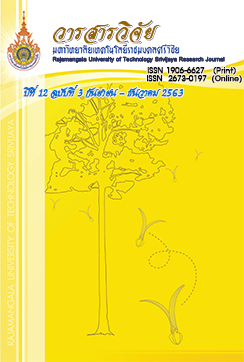Postnatal Mothers’ Satisfaction toward Postpartum Care Project using Thai Traditional Medicine of Ranod Hospital, Songkhla Province
Keywords:
satisfaction, postpartum mother care, Thai traditional medicine, Ranod hospital, Songkhla provinceAbstract
The purpose of this research aimed to 1) study personal information of postnatal mothers such as age, level of education, occupation, income, pregnancy order, antenatal care and breastfeeding, 2) evaluate satisfaction level of postnatal mothers who attended postpartum care project through the use of Thai traditional medicine, and 3) compare satisfaction level between first-child postnatal mothers and second-child postnatal mothers toward the postpartum care project. Twenty-six of postnatal mothers were enrolled in the postpartum care project at Ranod Hospital, Songkhla during June to July 2017. The data were collected by using questionnaires and the statistics used for analyzing data were percentage, means, standard deviation and paired t-test. The results revealed that most of the postnatal mothers aged between 21-25 years old (38.45%), completed junior high school (34.62%), were housewife (50.00%), earned enough income and saving (34.62%), experienced first-time pregnancy (61.54%), received antenatal care at the hospital (73.08%), and enabled breastfeeding (69.23%). The hospital provided four postpartum care services which were massage, herbal ball compression, hot salt pot compression and herbal steam. The participants had the highest satisfaction toward herbal ball compression (53.84%), followed by hot salt pot compression (42.30%). The results also indicated that the service significantly reduced mental stress in postnatal mothers (p<0.05) after they received postpartum care service.
References
กอบกุล พันธ์เจริญวรกุล. 2554. การพยาบาลครอบครัวและการผดุงครรภ์. มหาวิทยาลัยสุโขทัยธรรมาธิราช, นนทบุรี.
เกษร อังศุสิงห์. 2557. คู่มือแนวทางการผดุงครรภ์มารดาด้วยการแพทย์แผนไทย สถาบันการแพทย์แผนไทย. สำนักงานกิจการโรงพิมพ์องค์การสงเคราะห์ทหารผ่านศึกในพระราชูปถัมภ์, กรุงเทพฯ.
จุฑามาศ แซ่ลิ่ม. 2556. การใช้การแพทย์แผนไทยร่วมกับการแพทย์แผนปัจจุบันในการดูแลครรภ์ กรณีศึกษา หมู่บ้านท่าโต้ อำเภอสะเดา จังหวัดสงขลา, น. 22-30. ใน รายงานการประชุมหาดใหญ่วิชาการ ครั้งที่ 4. มหาวิทยาลัยหาดใหญ่, สงขลา.
ปริย ญาณวารี. 2545. อิทธิพลของสัมพันธภาพในชีวิตสมรส ลักษณะการอบรมเลี้ยงดูที่ได้รับ และประวัติการแยกห่างจากบุคคลสำคัญในชีวิตที่ส่งผลต่อพฤติกรรมการดูแลครรภ์ และแนวโน้มของพฤติกรรมการเลี้ยงดูบุตรของมารดา. วิทยานิพนธ์ปริญญาศิลปศาสตร์มหาบัณฑิต, มหาวิทยาลัยศิลปากร. อ้างถึง Best, J.W. 1981. Research in Education. Prentice – Hall.New, Jersey.
วนิตา เจ๊ะสัน, วริศรา สาระวารี, จักรเรศ สราญฤทธิชัย, วันวิสา สังวรนวล,วิทยา จิตรานนท์, ฐากูร สิงหาภ และ กุสุมาลย์ น้อยผา. 2561. ปัจจัยที่มีผลต่อการดูแลตนเองของหญิงหลังคลอดด้วยการแพทย์พื้นบ้าน: กรณีศึกษาโรงพยาบาลบางกล่ำ จังหวัดสงขลา, น. 339-352. ใน รายงานการประชุมวิชาการระดับชาติด้านศิลปศาสตร์ ครั้งที่ 3 ประจำปี 2561. มหาวิทยาลัยเทคโนโลยีราชมงคลศรีวิชัย, สงขลา.
วรรณา ดำเนินสวัสดิ์. 2558. ทัศนคติ การรับรู้ และความตั้งใจ ของหญิงตั้งครรภ์ต่อการใช้บริการส่งเสริมสุขภาพหลังคลอดด้วยการแพทย์แผนไทย จังหวัดลำปาง. สารนิพนธ์ปริญญาสาธารณสุขศาสตรมหาบัณฑิต, มหาวิทยาลัยธรรมศาสตร์.
ศรีศักดิ์ สุนทรไชย. 2555. ผดุงครรภ์แผนไทยเล่ม 1. มหาวิทยาลัยสุโขทัยธรรมาธิราช, นนทบุรี.
สุภาพร ผลจันทร์. 2555. ผดุงครรภ์แผนไทยเล่ม2. มหาวิทยาลัยสุโขทัยธรรมาธิราช, นนทบุรี.
อาภารัศมี ณะมณี. 2556. การสร้างเสริมสุขภาพของมารดาและเด็ก: มุมมองจากศาสตร์ของการแพทย์แผนไทยและศาสตร์ของการแพทย์แผนปัจจุบัน. ธรรมศาสตร์เวชสาร 13(1): 79-88.
หมายเหตุ: บทความนี้มาจากงานประชุมวิชาการระดับชาติ สวนดุสิต 2018 ครั้งที่ 3 ปี พ.ศ. 2561
Downloads
Published
How to Cite
Issue
Section
License
The content and information in the article published in Journal of Rajamangala University of Technology Srivijaya It is the opinion and responsibility of the author of the article. The editorial journals do not need to agree. Or share any responsibility.







